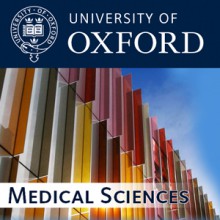
Relevant Links
The Medical Sciences Division is the University's largest academic division and includes Biochemistry, Experimental Psychology and the clinical and preclinical departments of the Medical School. The Division is an internationally recognised centre of excellence for basic biomedical and clinical research and teaching. World-leading programmes, housed in state-of-the-art facilities, cover the full range of scientific endeavour from the molecule to the population. With its NHS partners the Division also fosters the highest possible standards in patient care.
| # | Episode Title | Description | People | Date | |
|---|---|---|---|---|---|
| 12 | Genomic Medicine - hype or hope? | For the Inaugural Radcliffe Lecture 2014 Professor Hugh Watkins explores the success and limitations of genome sequencing in simple Mendelian diseases and in complex disorders, against the backdrop of his ground breaking research into heart disease. | Hugh Watkins | 13 Apr 2015 | |
| 11 | preDICT: Cardiac Electrophysiology Modeling | preDiCT is a major EU-funded project. It's purpose is to make computer models of cardiac electrophysiology, to help predict drug safety. | Arthur Thomas, Denis Noble, Gary Mirams, Lucía Romero | 06 Jun 2011 | |
| 10 | Creative Commons | Understanding human pain, suffering and relief through brain imaging | Professor Irene Tracey talks about her research into pain through using brain imaging technology to see exactly how the brain is affected by pain while discussing its implications to how we understand pain in society. | Irene Tracey | 09 Nov 2009 |
| 9 | David Smith on Dementia | Professor Smith talks about his research at OPTIMA (Oxford Project To Investigate Memory and Ageing) on dementia, particularly Alzheimer's and the relation between diet and blood pressure in younger life and dementia in older life. | David Smith, Oliver Lewis | 17 Aug 2009 | |
| 8 | Kim Nasmyth on Biochemistry | Head of the Department of Biochemistry Professor Kim Nasmyth talks about the department and what it means to be a biochemist at Oxford. | Kim Nasmyth | 07 Jul 2009 | |
| 7 | Genetics with Kay Davies | Kay Davies discusses her research of genetic diseases such as Duchenne Muscular Dystrophy, problems which limit the development of therapy and the need for effective treatment and screening processes. | Kay Davies, Oliver Lewis | 09 Feb 2009 | |
| 6 | Gero Miesenboeck on Fruit Flies and Neuroscience | In this podcast, Professor Gero Miesenboeck begins with a discussion of DNA and neuroscience, and then talks about his experiments on the brain of the fruit fly. | Gero Miesenboeck, Oliver Lewis | 13 Sep 2008 | |
| 5 | Jennifer Lau on Anxiety and Depression in Children | Dr Jennifer Lau discusses her research into the development of anxiety and depression in childhood and adolescence. | Jennifer Lau, Oliver Lewis | 13 Sep 2008 | |
| 4 | Craig Venter on Genomics | In the second of the Distinguished Public Lecture Series run by the James Martin 21st Century School, Dr Craig Venter discusses his work at the J. Craig Venter Institute and its implications for the future of our culture, society and science. | J Craig Venter | 12 Sep 2008 | |
| 3 | Irene Tracey on FMRI and Pain | Professor Irene Tracey, director of the Oxford Centre for Functional Magnetic Resonance Imaging of the Brain, explains how MRI works and then talks about her research into people's perception of pain. | Irene Tracey, Oliver Lewis | 12 Sep 2008 | |
| 2 | Thomas Helleday on Cancer | Professor Helleday explains what cancer is, the problems of treating it, and the success of his own research in developing new treatments. | Thomas Helleday | 11 Sep 2008 | |
| 1 | Andrew Pollard on Childhood Disease | Professor Andrew Pollard, Professor of Paediatric Infection and Immunity, and Director of the Oxford Vaccine Centre, discusses childhood diseases, his research into vaccinations, and the problems facing childhood immunisation in the UK and abroad. | Andrew Pollard, Oliver Lewis | 10 Sep 2008 |
